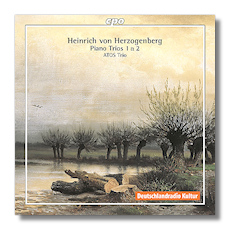
The Internet's Premier Classical Music Source
Related Links
- Herzogenberg Reviews
- Latest Reviews
- More Reviews
-
By Composer
-
Collections
DVD & Blu-ray
Books
Concert Reviews
Articles/Interviews
Software
Audio
Search Amazon
Recommended Links
Site News
 CD Review
CD Review
Heinrich von Herzogenberg

Piano Trios
- Trio for Piano & Strings #1 in C minor, Op. 24
- Trio for Piano & Strings #2 in D minor, Op. 36
ATOS Trio
CPO 777335-2 DDD 64:06
Aimez-vous Brahms? Heinrich von Herzogenberg (1843-1900) did, or at least he was highly influenced by Brahms' music, and, starting in 1874, he corresponded frequently with the elder composer. He even married one of Brahms' former piano students, a woman for whom Brahms himself might have had tender feelings. In this context, perhaps it is less surprising that although Brahms and the Herzogenbergs enjoyed cordial relations, Brahms was reticent about praising Herzogenberg's music.
These two piano trios, which date from 1876 and 1882, respectively, are strongly influenced by Brahms. In fact, I wager that most listeners, unless they are forewarned, will quickly but mistakenly identify Brahms as the composer. Herzogenberg probably would have been delighted by this error, whereas Brahms probably would have grumbled over it!
It would be wrong, however, to characterize Herzogenberg as an imitator of Brahms who had nothing of his own to offer. His multifaceted career was illustrious. He taught Ethel Smyth and advised Ralph Vaughan Williams, and worked with Philipp Spitta to revive Bach's sacred music – particularly the cantatas, which largely had been ignored in the one hundred years since Bach's death. He wrote a respectable amount of music in many genres, and CPO has played a large role in making it available again to both the scholarly and the merely curious.
Herzogenberg's contemporaries also recognized (but not dismissively) the debt that he paid to Brahms in the Piano Trio #1. This trio was published before it was premièred, and a contemporary review praised it, granting that "it addresses itself to the erudite, not to the musical peasantry." Truly, there's little about it that is facile, or that fawns at the listener. Without breaking new ground, it lives up the highest technical and emotional standards, and that counts for something. The Piano Trio #2 is more polished yet, although its introspective (but hardly fatalistic) mood is similar. After its première, the trio was praised more for its construction than for the appeal of the materials themselves. Spitta approved of it, although he expressed a desire to "wish away the few reminiscences of Brahms." Both works were forgotten until recently, although this is not their first recording. (The Arensky Trio on Antes beat the ATOS Trio to the punch by five years.)
I haven't heard the version on Antes. The ATOS Trio (Annette von Hehn, violin; Stefan Heinemeyer, cello; and Thomas Hoppe, piano) was formed in 2003. They won the Kalichstein-Laredo-Robinson International Trio Award in 2007, and have been well-received in their native Germany. On this CD, they play with refinement, and in fact, there were times when I felt that a more extraverted approach would not have compromised Herzogenberg's music. The three members play as if they are very comfortable with each other, and the blend among them is excellent. I would need to hear them in familiar repertory to make a more cogent assessment, but I didn't hear anything on this CD that got in the way of my making an acquaintance with Herzogenberg's worthwhile piano trios. In other words, the performances are entirely satisfactory. Good sound too.
Copyright © 2008, Raymond Tuttle




















